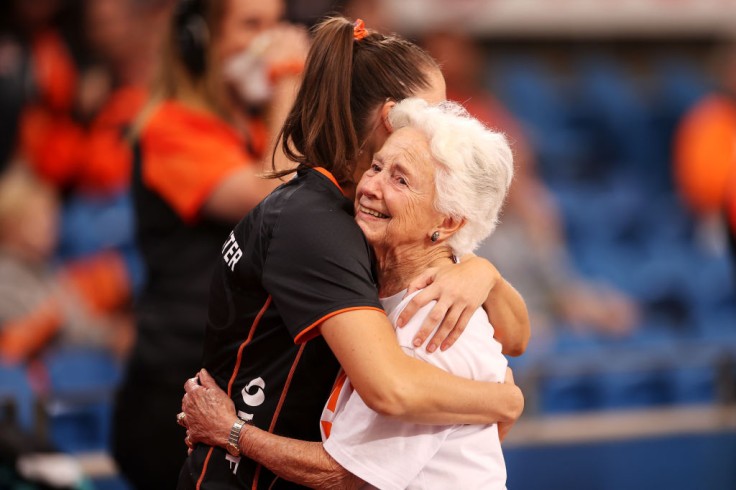
In the intricate tapestry of family relationships, the role of grandmothers is both universal and uniquely diverse. One fascinating aspect of this diversity is the array of names by which grandmothers are lovingly called across different cultures.
This compilation of 20 international grandmother names not only highlights the richness of language but also emphasizes the importance of cultural diversity in shaping family traditions.
25 International Names for Grandmothers
1. Nonna (Italian) - Embracing the Warmth of Tradition
In the heart of Italy, grandmothers are affectionately known as Nonna. The term Nonna not only carries a sense of familiarity but also encapsulates the nurturing spirit and warmth that Italian grandmothers are known for.
2. Abuela (Spanish) - A Title of Endearment and Wisdom
Crossing over to the Spanish-speaking world, grandmothers are lovingly referred to as Abuela. This title reflects the deep respect and admiration for the wisdom and care that grandmothers provide to their families.
3. Oma (German) - Comfort and Familiarity in Every Oma's Embrace
In Germany, grandmothers are called Oma, a term that exudes a sense of comfort and familiarity. It represents the close bonds within German families and the central role that grandmothers play.
4. Babcia (Polish) - Strong Family Ties and Central Role
The Polish term Babcia reflects the strong familial ties and the central role grandmothers play in family life. It speaks to the importance of family bonds in Polish culture.
5. YiaYia (Greek) - Celebrating Close-Knit Family Structures
In Greece, the term YiaYia is used, emphasizing the close-knit family structures and the importance of familial bonds. YiaYia represents the matriarchal figure who is revered and loved.
6. Halmeoni (Korean) - Respecting Ancestral Wisdom
Halmeoni is the Korean word for grandmother, reflecting the rich cultural values of respect and family unity. The term embodies the reverence for ancestral wisdom passed down through generations.
7. Savta (Hebrew) - Love, Care, and Passing Down Traditions
In Israel, grandmothers are often referred to as Savta, a term that reflects love, care, and the passing down of cultural traditions. Savtas are the keepers of family stories and customs.
8. Avó (Portuguese) - Familial Ties and Cherished Roles
Avó is the Portuguese term for grandmother, signifying familial ties and the cherished role of grandmothers in Portuguese culture. It echoes the importance of generations coming together.
9. Bubbe (Yiddish) - A Term of Warmth and Love
In Yiddish-speaking communities, grandmothers are lovingly called Bubbe, a term that evokes warmth and familial love. Bubbes are known for their nurturing and caring nature.
10. Lola (Filipino) - Instilling Respect and Wisdom
In the Philippines, grandmothers are commonly known as Lola, a title that emphasizes respect and the wisdom that comes with age. Lolas are revered figures in Filipino families.
11. Ajji (Kannada - India) - Deep-Rooted Family Values
The term Ajji is used in the Kannada language in India, reflecting the deep-rooted family values and the affectionate relationship with grandmothers. Ajjis are often the storytellers of family history.
12. Mémè (French) - Conveying Love and Connection
French-speaking grandmothers are often called Mémè, a term that conveys a sense of love and connection. Mèmès are central figures in French families, providing a sense of stability and love.
13. Bunica (Romanian) - Nurturing and Caring Presence
In Romania, grandmothers are addressed as Bunica, symbolizing the nurturing and caring role they play in the family. Bunica is a source of comfort and guidance.
14. Nai Nai (Mandarin Chinese) - Familial Respect and Connections
Nai Nai is the Mandarin term for grandmother, emphasizing familial respect and intergenerational connections. Nai Nais often embody traditional values in Chinese families.
15. Ammamma (Telugu - India) - Affectionate Ties and Family Bonding
In Telugu-speaking communities in India, grandmothers are affectionately called Ammamma, reflecting close-knit family structures and the importance of family bonding. Ammammas are revered for their wisdom.
16. Ouma (Afrikaans) - Strong Ties and Respect for Elders
Ouma is the term for grandmother in Afrikaans, representing strong ties and respect for elders in South African culture. Oumas often play a central role in passing down cultural heritage.
17. Bibi (Swahili) - Emphasizing Wisdom and Respect
In Swahili-speaking regions, grandmothers are often called Bibi, emphasizing respect for elders and the wisdom they possess. Bibis are seen as wise matriarchs.
18. Obaasan (Japanese) - Signifying Family and Wisdom
Obaasan is the Japanese term for grandmother, signifying the importance of family and the wisdom that comes with age. Obaasans are revered for their experience and guidance.
19. Nanay (Tagalog - Philippines) - Maternal Care and Love
In Tagalog, grandmothers are often referred to as Nanay, a term that reflects maternal care and the deep love they provide. Nanays are cherished figures in Filipino households.
20. Teta (Arabic) - Close Family Ties and Wisdom
In Arabic-speaking cultures, grandmothers are fondly called Teta, symbolizing close family ties and the wisdom they impart. Tetas are respected for their guidance and knowledge.
Celebrating the diverse names for grandmothers around the world not only highlights linguistic richness but also underscores the universal importance of family bonds.
Whether Nonna, Abuela, or Oma, the love and wisdom grandmothers share are truly international treasures that transcend language and cultural barriers.
In embracing and understanding these various grandmother names, we not only celebrate cultural diversity but also honor the integral role grandmothers play in shaping the stories of our families.
Related Article: First Birthday Gift Ideas: Top 5 Presents to Celebrate the Milestone